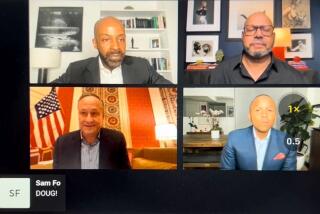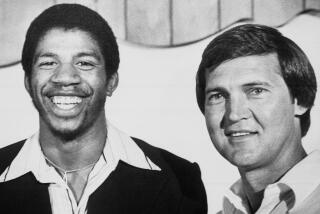HIV Group Stresses the Courage to Live : Health: Participants in the program are not terminally ill. They say it has provided them with a strong support system, which many had been missing.
- Share via
The seven men in the circle are brothers of a sort. Each has tested positive for the HIV virus and a few have developed AIDS symptoms. But as they pass a crystal around, each taking it and sharing a few words, the tone is anything but glum.
These are the people at the other end of the AIDS spectrum. They are not terminally ill, and in some cases not ill at all.
“I’m living!” declares Kerry Lewallen, 37, who was diagnosed with acquired immune deficiency syndrome about two years ago. “I’ve chosen to fight back and to look into myself to cope with the changes in my body.”
On Monday, Lewallen and other participants of Exceptional Persons with Immune Compromise, a support group at Century City Hospital, met for the first time since Earvin (Magic) Johnson’s startling disclosure that he has tested positive for the virus that causes AIDS.
Several praised Johnson for his courage, saying that his leadership will help lift a stigma attached to HIV infection and AIDS, and will focus the nation’s attention on attacking the epidemic. Those like Richard Liberman expressed solidarity with Johnson.
“Welcome to the club,” Liberman, 32, intoned, reading from a poem he wrote for the occasion. “We’re your brothers in part of a seamless quilt.”
But others were angry that it has taken a star such as Johnson to alter some people’s perceptions about HIV infection and AIDS. And they were equally skeptical over whether Johnson will ever experience--or understand--the alienation they have gone through.
“I see everyone in the world being there for Magic Johnson, but no one was there for me when I found out (I was HIV positive),” said Jim Jensen, 32.
Society, added Doug Moseman, 36, “needs to learn something about compassion.”
The group’s co-facilitator, psychotherapist Erin Childs, urged the participants to address their anger but not to be consumed by it. She told them to use Johnson’s action as a springboard for their own healing.
“No, it’s not fair that we weren’t recognized five or 10 years ago,” she said. “But that’s no reason to stop you from going after that job you want.”
Childs’ advice echoed what she has been telling the group since it began meeting six months ago. During the weekly sessions, participants, most of whom care for themselves, have been learning how to take charge of their lives.
For many, that means altering diets and cutting down on exhaustive exercise. For some, it means re-evaluating careers or getting involved politically for the first time in groups fighting AIDS.
For Liberman, it has meant summoning the courage to accept his own HIV status.
“It is very difficult when you carry secrets around,” Liberman said. “I have watched my friends die one at a time and have had to make a choice to live. That’s why I decided to get tested.”
Liberman and others say the group has taught them to confront their situations head-on and talk about the uncertainty of life with the HIV virus. Many say confronting death has helped renew their zest for living, while freeing them to settle old family conflicts.
The group also has provided them with a strong support system--something missing in many of their lives.
As the meeting on Monday came to a close, Childs led the group in a quiet meditation. The participants closed their eyes and listened to Childs, who spoke over soft background music. Some propped their feet on pillows.
“Remember, this is all about living,” she told them. “The question is, how can we maximize our lives most?”
More to Read
Sign up for Essential California
The most important California stories and recommendations in your inbox every morning.
You may occasionally receive promotional content from the Los Angeles Times.










